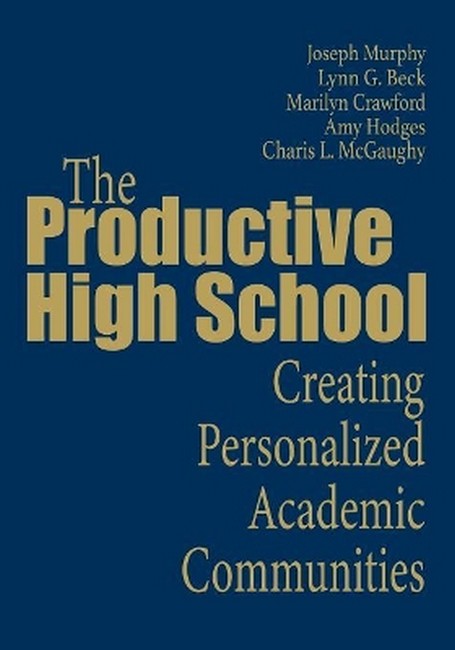Joseph F. Murphy is the Frank W. Mayborn Chair and associate dean at Peabody College of Education at Vanderbilt University. He has also been a faculty member at the University of Illinois and The Ohio State University, where he was the William Ray Flesher Professor of Education. In the public schools, he has served as an administrator at the school, district, and state levels, including an appointment as the executive assistant to the chief deputy superintendent of public instruction in California. His most recent appointment was as the founding president of the Ohio Principals Leadership Academy. At the university level, he has served as department chair and associate dean. He is past vice president of the American Educational Research Association and was the founding chair of the Interstate School Leaders Licensure Consortium (ISLLC). He is co-editor of the AERA Handbook on Educational Administration (1999) and editor of the National Society for the Study of Education (NSSE) yearbook, The Educational Leadership Challenge (2002). His work is in the area of school improvement, with special emphasis on leadership and policy. He has authored or co-authored 18 books in this area and edited another 12. His most recent authored volumes include Understanding and Assessing the Charter School Movement (2002), Leadership for Literacy: Research-Based Practice, PreK-3 (2003), Connecting Teacher Leadership and School Improvement (2005), Preparing School Leaders: Defining a Research and Action Agenda (2006), and Turning Around Failing Schools: Lessons From the Organizational Sciences. Lynn G. Beck is Dean of the School of Education at Pacific Lutheran University. Her research and teaching focuses on administrative ethics, principalship, and leadership preparation. Marilyn Crawford is currently serving as Director of the Office of Teaching and Learning in the School District of Lancaster in Pennsylvania, as well as continuing her work as a national consultant for middle and high school reform. Amy Hodges is the House Principal in charge of Curriculum, Instruction and Assessment at McCaskey East High School in Lancaster, Pennsylvania. Her work involves implementing district-wide, standards-based reform at the high school level. Dr. Charis McGaughy has worked within the educational arena for over two decades. She recently began serving as the chief of staff for the Eugene School District 4J. Prior to that, she was a director at the Educational Policy Improvement Center (EPIC) for almost 8 years. During her tenure, she worked all over the country on national, state, and district-level initiatives related to improving college and career readiness, and increasing secondary and postsecondary alignment. She has also worked at the state level for the Texas Education Agency and the Tennessee Department of Children Services. She began her career as a teacher, and has taught in Houston Independent School District and Boston Public Schools. Dr. McGaughy has considerable experience directing large-scale, multi-faceted educational policy initiatives, is an experienced public speaker, and is the author of several reports, chapters, and articles on education. Her background as an educator, an educational policy worker, and her extensive research experience enables her to serve as a bridge among various educational stakeholder groups. Dr. McGaughy holds a PhD in Educational Leadership, Policy and Organizations from Vanderbilt University, a master's degree in Public Affairs from the LBJ School of Public Affairs at the University of Texas at Austin, and a BA in Government from Pomona College.
Request Academic Copy
Please copy the ISBN for submitting review copy form
Description
PART ONE: LESSONS LEARNED Formation of the American High School 1635-1890 Development of the Comprehensive High School 1890-1920 Institutionalization of the Comprehensive High School 1920-1980 PART TWO: THE CLASSROOM DYNAMICS OF ENGAGED LEARNING AND TEACHING High Expectations Personal Support Academic Autonomy PART THREE: WEAVING SUPPORT FOR A PERSONALIZED, ACADEMIC HIGH SCHOOL Anchoring Schools on a Clearly Defined Learning Imperative Building Schools on Humanized, Intellectual Relationships for Learning Nesting Schools in a Dynamic, Adaptive Local Culture for Change Linking Schools with Home and Family PART FOUR: CONCLUSION Explanation and Integration Exploring the Theoretical Underpinnings of Research on the Productive High School
"This important book explores the fundamental reasons why our secondary schools look and work in the ways that they do, and synthesizes a substantial body of research in a highly readable form. It should be part of every secondary administrator's bookshelf and every university's preparation program." -- Karen Seashore Louis "Educators rarely find so many thoughts so well organized and in a single volume...the combination of theory, research, and example is a strength of this book...the authors present a compelling vision of what high schools can be." -- Paul Goldman * NASSP Bulletin * "Highly recommended for any educator in search of tips, tricks, and techniques for self improvement on the job." -- The Midwest Book Review * December 2001 issue * "This volume suggests powerful practice helpful for teachers, prospective teachers, and anyone with a vested interest in the contemporary public high school." -- B. L. Nourie, Illinois State University * CHOICE, 2002 * "The book should be useful to policy makers, teacher educators, administrators, schools, and communities planning for and working toward increased success and meaningful change in high schools. Its primary contribution is its potential to help schools understand why they are being encouraged to change in particular ways and what benefits they might expect from building on solid, empirical research." -- Journal of Education for Students Place At Risk

